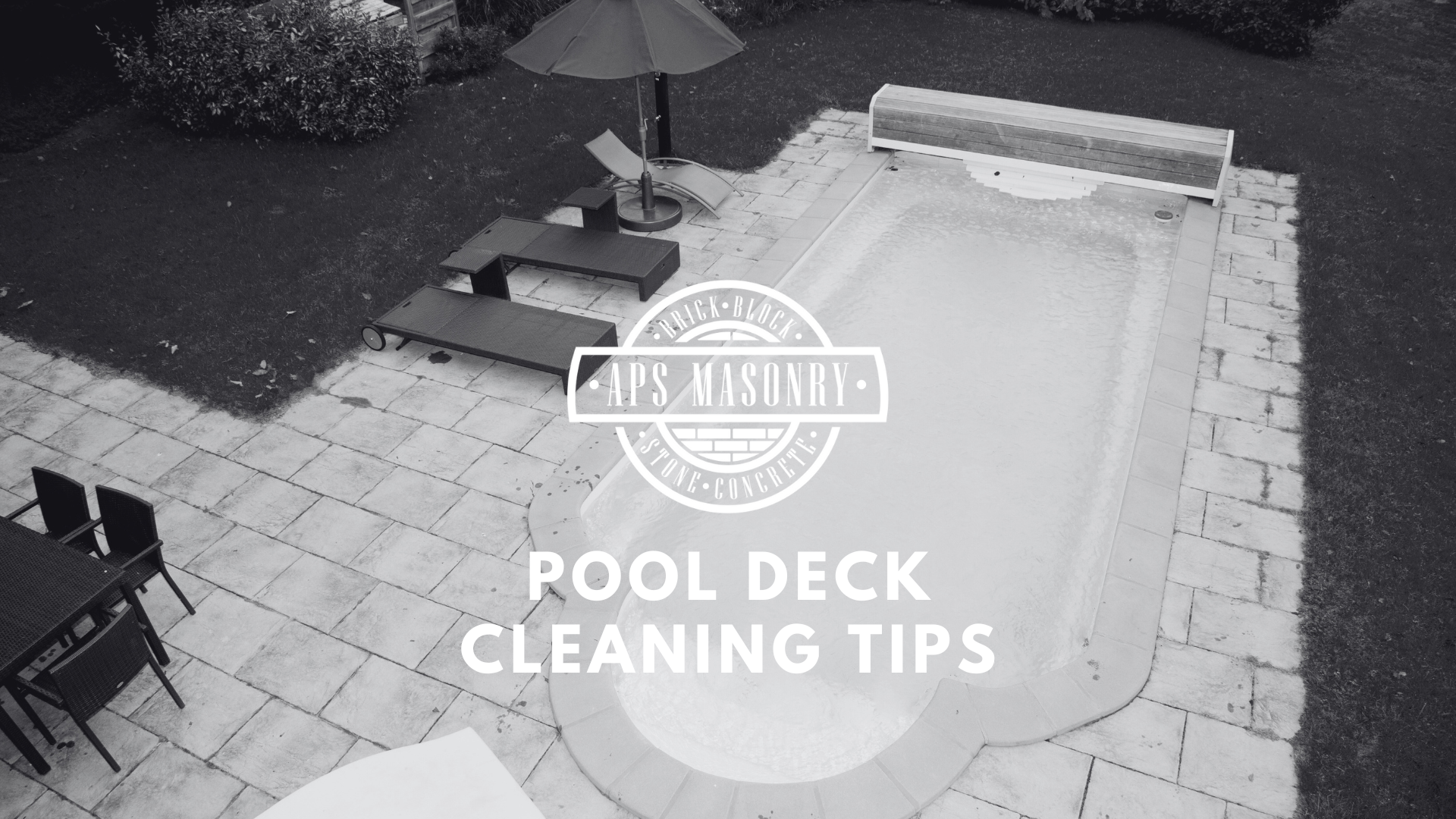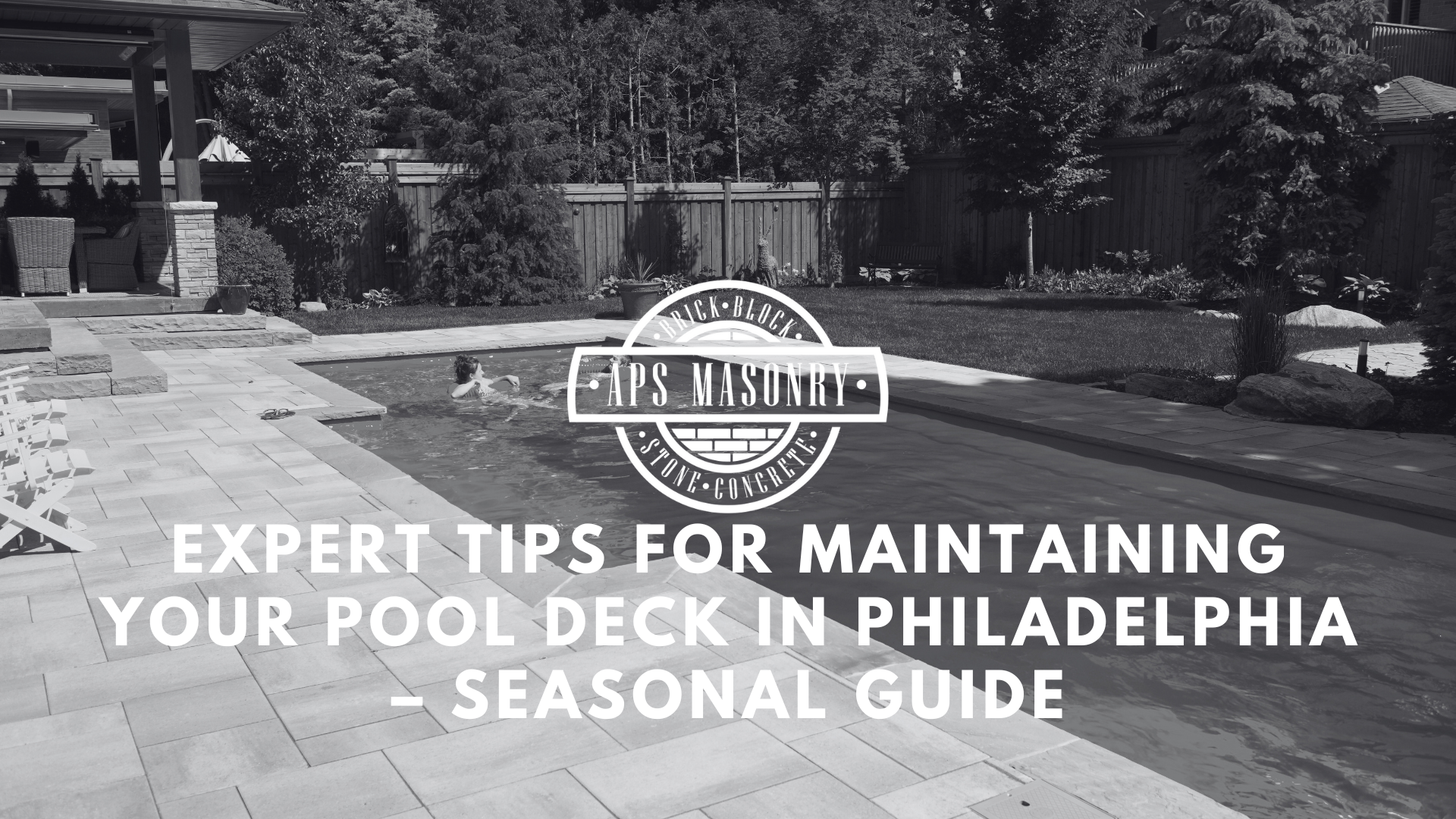Selecting the right pool decking is crucial for enhancing the aesthetics, safety, and functionality of your outdoor space. A well-chosen pool deck not only complements your pool but also increases the overall value of your property.
According to a study by the National Association of Realtors, a well-designed outdoor space, including a pool deck, can increase a home’s value by up to 12.4%. Additionally, the right material can improve safety by providing slip resistance and staying cool underfoot, which is particularly important in hot climates for bare feet. There are various pool deck materials available, each offering unique benefits and considerations.
This blog will provide an in-depth look at today’s top pool decking options. We will explore the advantages and disadvantages of each material, maintenance tips, and factors to consider when choosing. By the end of this guide, you’ll be well-equipped to choose the perfect decking to transform your backyard into a stunning and safe oasis.
Concrete Pool Decks
Advantages of Concrete
Concrete is a popular choice for pool decking due to its durability and versatility. Its long-lasting nature makes it a cost-effective option, as it can withstand heavy foot traffic and harsh weather conditions without deteriorating quickly. Concrete pool decks can be customized in numerous ways to fit any design preference. From various colors to unique patterns, concrete offers a wide range of aesthetic options, allowing it to blend with the home's exterior facade and surrounding landscape or stand out as the focal point of the backyard.
Different Finishes Available
- Stamped Concrete: This finish mimics the look of other materials like stone, brick, or tile. It provides a high-end appearance at a fraction of the cost.
- Stained Concrete: Staining can give concrete a rich, variegated color that can enhance the visual appeal of your pool area. Stains penetrate the surface, creating a long-lasting hue.
- Textured Concrete: Adding texture to concrete improves its slip resistance, making it safer for poolside areas. Techniques such as broom finishes or exposed aggregate add both style and safety. Various methods and materials can be used to create pool decks with different finishes, including decorative concrete, stamped concrete, colored concrete, stenciled concrete, rock-salt finish concrete, exposed aggregate, and brushed or broom finish.
Maintenance Tips
Maintaining a concrete pool deck is relatively straightforward. Here are some key tips:
- Regular Cleaning: Sweep the deck regularly to remove debris. Use a mild detergent and water for deeper cleaning, especially to remove any algae or mold buildup.
- Sealing: Apply a concrete sealer every few years to protect the surface from water damage, stains, and UV rays. Sealing also helps preserve the color and finish.
- Repair Cracks Promptly: Small cracks can develop over time. Address them quickly to prevent them from spreading and causing more significant damage.
- Avoid Harsh Chemicals: When cleaning, avoid using harsh chemicals that can erode the concrete or damage its finish.
Concrete pool decking offers durability, customization, and ease of maintenance, making it a smart choice for many homeowners looking to enhance their pool area.
Call us today
Paver Pool Decking
Benefits of Pavers
Paver pool decking provides several benefits, making it a popular choice for many homeowners:
- Aesthetics: Pavers offer a visually appealing option with a wide range of colors, shapes, and patterns. This versatility allows for unique designs that can complement any backyard style.
- Slip-Resistance: Pavers are naturally slip-resistant, which enhances safety around the pool area. Their textured surfaces reduce the risk of accidents, especially when wet.
- Decking Material: When selecting the perfect pool decking material, pavers stand out due to their combination of aesthetics, safety, and low maintenance requirements.
Variety of Materials
- Brick Pavers: Brick pavers provide a classic, timeless look. They are durable and can withstand various weather conditions. However, they may require more maintenance to prevent algae growth.
- Stone Pavers: Stone pavers, such as travertine or slate, offer a luxurious and natural appearance. They stay cool underfoot and blend seamlessly with natural landscapes. Stone pavers are also highly durable and weather-resistant.
- Concrete Pavers: Concrete pavers are cost-effective and available in numerous styles and finishes. They can mimic the look of brick or stone at a lower cost. Concrete pavers are also durable and easy to replace if damaged.
- Comparison with Other Pool Deck Materials: When compared to other pool deck materials like natural stone and brick, pavers offer a balance of cost, durability, and design flexibility, making them a versatile choice for pool decking.
Installation Process and Maintenance
Installation Process
- Preparation: The area needs to be excavated and leveled. A proper base layer of gravel or sand is laid down to ensure stability.
- Laying Pavers: Pavers are laid out in the desired pattern. Edging is installed to keep the pavers in place. Sand is spread over the pavers and swept into the joints to secure them.
- Compaction: The pavers are compacted to ensure a level surface and proper settling. This step also helps lock the pavers in place.
Maintenance
- Regular Cleaning: Sweep the paver deck regularly to remove debris. Use a pressure washer occasionally to clean deeper dirt and stains.
- Weed Control: Weeds can grow between paver joints. Use a weed barrier during installation and apply a weed killer as needed.
- Sealant Application: Apply a sealant every few years to protect pavers from stains and weathering. This also enhances their color and longevity.
- Repair and Replacement: Inspect the pavers periodically for any damage or shifting. Replace any damaged pavers promptly to maintain the integrity of the deck.
Paver pool decking combines beauty, safety, and practicality, making it an excellent choice for creating an attractive and functional pool area.
Wood Pool Decking
Pros of Wood Decking
Wood pool decking offers several advantages that make it an appealing choice for homeowners:
- Natural Look: Wood provides a warm, natural appearance that blends seamlessly with outdoor environments. Its aesthetic appeal adds a rustic charm to your pool area.
- Comfort: Wood stays relatively cool underfoot, making it comfortable to walk on even on hot days. Its smooth surface also offers a pleasant tactile experience.
- Versatile Pool Deck Material: As a pool deck material, wood offers design flexibility and can be customized to fit various styles and preferences. Its strength and durability make it a reliable choice compared to other materials like concrete.
Popular Wood Types
- Cedar: Cedar is a popular choice for pool decking due to its natural resistance to decay and insects. It has a beautiful, reddish-brown hue and a pleasant aroma. Cedar is also relatively lightweight and easy to work with.
- Redwood: Redwood is known for its rich color and natural durability. It is resistant to rot and insects, making it a long-lasting option. Redwood’s stability and straight grain make it an attractive and practical choice for decking.
- Ipe: Ipe, also known as Brazilian walnut, is a dense hardwood that is exceptionally durable. It has a dark, rich color and is highly resistant to wear, insects, and rot. Ipe’s longevity makes it a premium choice for pool decking, although it can be more challenging to work with due to its density.
Treatment and Upkeep Required
- Sealing and Staining: To protect wood from moisture, UV rays, and general wear, apply a high-quality sealer or stain. This treatment helps preserve the wood’s color and extends its lifespan. Reapply every 1-2 years for optimal protection.
- Regular Cleaning: Sweep the deck regularly to remove debris. Use a mild detergent and water to clean the surface, removing any dirt, algae, or mildew buildup. Avoid using harsh chemicals that can damage the wood.
- Inspect and Repair: Periodically inspect the deck for any signs of damage, such as cracks or splinters. Address any issues promptly to prevent further deterioration. Sand rough spots and apply wood filler to repair minor damages.
- Preventive Measures: Place protective pads under furniture to avoid scratches and dents. Use a cover during the off-season to protect the deck from weather elements and debris.
Wood pool decking offers a combination of natural beauty and comfort, making it a desirable option for many homeowners. With proper treatment and upkeep, wood decking can provide a durable and visually pleasing surface for your pool area.

Composite Pool Decking
Why Choose Composite
Composite pool decking offers several advantages, making it a popular choice for many homeowners:
- Low Maintenance: Composite decking requires minimal upkeep compared to traditional wood. It doesn't need staining, sealing, or frequent cleaning. This saves time and effort, making it a convenient option for busy homeowners.
- Eco-Friendly: Composite decking is made from recycled materials, such as wood fibers and plastic. Choosing composite helps reduce waste and promotes sustainability, making it an environmentally friendly option.
Comparison with Traditional Wood
- Durability: Composite decking is highly durable and resistant to rot, warping, and insect damage, unlike traditional wood. This longevity makes it a cost-effective choice over time.
- Maintenance: Traditional wood decking requires regular maintenance, including sealing, staining, and repairs. Composite decking eliminates most of these tasks, maintaining its appearance with just occasional cleaning.
- Aesthetics: While wood offers a natural look, composite decking has evolved to mimic the appearance of wood closely. Advanced manufacturing techniques provide a realistic wood grain and a variety of colors.
- Cost: Initially, composite decking may have a higher upfront cost compared to some wood options. However, lower maintenance costs and longer lifespan often result in overall savings.
Available Styles and Colors
Composite decking comes in a wide range of styles and colors to suit any design preference:
- Styles: Composite boards are available in various textures, including smooth, grooved, and embossed wood grain finishes. These options allow for a customized look that can complement traditional or contemporary designs.
- Colors: Composite decking offers a broad palette of colors, from natural wood tones like cedar and mahogany to modern shades like gray and black. This variety enables homeowners to match their decking with the overall aesthetic of their outdoor space.
- Board Sizes: Composite decking is available in multiple board widths and lengths, providing flexibility in design and installation.
Composite pool decking combines the best features of durability, low maintenance, and eco-friendliness, making it an ideal choice for many homeowners. Its wide range of styles and colors ensures that you can find the perfect match for your pool area, creating a beautiful and long-lasting outdoor space.
Tile Pool Decking
Appeal of Tile
Tile pool decking is a popular choice due to its elegant look and versatility. It offers:
- Elegant Look: Tiles provide a sleek, polished appearance that enhances the aesthetic appeal of any pool area. Their clean lines and sophisticated finish can elevate the overall design of your backyard.
- Wide Variety: Tiles come in an extensive range of colors, sizes, shapes, and patterns. This variety allows for endless customization options, enabling homeowners to create unique and personalized designs that reflect their style.
Best Tile Materials for Pool Areas
- Porcelain: Porcelain tiles are an excellent choice for pool decking due to their durability and low porosity. They are resistant to water absorption, making them ideal for wet areas. Porcelain tiles are also available in various finishes, including matte and textured, which provide slip resistance.
- Natural Stone: Stone tiles, such as travertine, slate, and granite, offer a natural and timeless look. They are durable and can withstand harsh weather conditions. Natural stone tiles typically stay cool underfoot, enhancing comfort around the pool area.
Care and Durability
- Regular Cleaning: To maintain the appearance of tile decking, regular cleaning is essential. Sweep away debris and wash the tiles with a mild detergent and water. For stubborn stains, use a soft brush and avoid harsh chemicals that could damage the tile surface.
- Sealing: Some tile materials, especially natural stone, may require sealing to protect against moisture and stains. Seal the tiles as recommended by the manufacturer to prolong their lifespan and maintain their appearance.
- Grout Maintenance: Over time, grout lines can accumulate dirt and mildew. Clean the grout regularly with a grout cleaner or a mixture of baking soda and water. Sealing the grout can also prevent staining and make cleaning easier.
- Durability: Tile pool decking is highly durable and can last for many years with proper care. Porcelain and natural stone tiles are resistant to cracking, fading, and wear. However, it’s important to address any damage promptly to prevent further issues. Replace cracked or chipped tiles to maintain the integrity and safety of the decking.
Tile pool decking offers a combination of elegance, variety, and durability, making it an attractive option for many homeowners. By choosing high-quality materials like porcelain or natural stone and following proper maintenance practices, you can ensure that your tile pool decking remains beautiful and functional for years to come.
Travertine Pool Decking
Unique Features of Travertine
Travertine pool decking stands out for several reasons:
- Natural Stone: Travertine is a type of limestone formed by mineral deposits from natural springs. Its natural stone composition gives it a unique, timeless beauty with a range of earthy tones and textures. This natural look enhances the aesthetic appeal of any outdoor space.
- Cool Underfoot: One of the most notable features of travertine is its ability to remain cool underfoot, even in hot weather. This makes it a comfortable choice for pool decking, allowing you to walk barefoot without discomfort.
Reach Out for a Free Estimate
Installation Considerations
- Substrate Preparation: Proper substrate preparation is essential for a stable and long-lasting travertine pool deck. The area must be excavated and leveled, with a suitable base of gravel or sand laid down to ensure good drainage and stability.
- Mortar and Grouting: Travertine tiles are typically set in a bed of mortar. It’s important to use a high-quality, flexible mortar to accommodate slight movements and prevent cracking. Grout should be chosen to match or complement the tiles and must be sealed to prevent water infiltration.
- Sealing: Although travertine is durable, it is also porous. Sealing the tiles during installation helps protect them from moisture, stains, and damage. It is recommended to use a penetrating sealer that will not alter the stone's natural appearance.
Long-Term Care
- Regular Cleaning: Travertine pool decking should be swept regularly to remove debris. Wash the surface with a mild detergent and water to prevent buildup of dirt and grime. Avoid acidic cleaners, as they can damage the stone.
- Sealing Maintenance: Reapply sealant every 1-2 years, depending on usage and exposure to the elements. This helps maintain the stone’s resistance to stains and water damage.
- Addressing Stains and Damage: Promptly clean any spills to prevent staining. For minor stains, a poultice made from baking soda and water can be effective. Inspect the deck regularly for signs of damage, such as chips or cracks, and repair them promptly to prevent further deterioration.
- Winter Care: In colder climates, protect travertine decking from freeze-thaw cycles, which can cause cracking. Use a cover during the winter months and avoid using harsh de-icing chemicals.
Travertine pool decking combines natural beauty, comfort, and durability, making it an excellent choice for pool areas. With proper installation and maintenance, travertine decking can provide a stunning and functional surface that enhances your outdoor living space for many years.
APS Masonry Contracting Services
APS Masonry Contracting specializes in a broad range of masonry services tailored to enhance residential and commercial properties. Our services include:
- Pool Decking Installation: We offer professional installation of various pool decking materials, ensuring a high-quality, durable finish.
- Custom Masonry Work: From stone patios to walkways and retaining walls, our custom masonry solutions are designed to meet your unique aesthetic and functional needs.
- Concrete Services: Our team handles everything from basic concrete installations to intricate stamped and stained concrete projects.
- Paver Installations: We provide expert installation of paver patios, driveways, and pool decks, using materials like brick, stone, and concrete pavers.
- Repair and Restoration: We offer repair and restoration services to extend the life and beauty of your existing masonry structures.
Get A Quote Now
Experience and Expertise in Pool Decking
With years of experience in the masonry industry, APS Masonry Contracting has developed a strong reputation for excellence in pool decking. Our team consists of skilled professionals who are adept at working with a variety of materials, including concrete, pavers, wood decks, composite, and natural stone. We take pride in delivering projects that are not only aesthetically pleasing but also safe and durable. Our expertise ensures that your pool decking will withstand the test of time, weather, and heavy use.
Conclusion
Choosing the right pool decking is essential for enhancing the beauty, safety, and functionality of your outdoor space. We have explored various pool decking options, each offering unique benefits:
- Concrete Pool Decking: Durable and versatile, with options like stamped, stained, and textured finishes. Concrete pool decks can be customized in shape, size, color, and surface treatment to blend with your home's exterior facade or stand out as the focal point of your backyard.
- Paver Pool Decking: Aesthetic and slip-resistant, available in materials like brick, stone, and concrete.
- Wood Pool Decking: Offers a natural look and comfort, with popular choices such as cedar, redwood, and ipe.
- Composite Pool Decking: Low maintenance and eco-friendly, providing a modern appearance.
- Tile Pool Decking: Elegant and varied, with materials like porcelain and natural stone.
- Travertine Pool Decking: Natural stone that stays cool underfoot and is highly durable.
- Rubber Pool Decking: Safe and comfortable, ideal for families with children.
Concrete pool decks are often compared to other pool deck materials like natural stone and tile, each having its own pros and cons in terms of durability, aesthetics, and maintenance.
Each of these options can transform your pool area into a stunning and practical outdoor oasis.
At APS Masonry Contracting, we bring extensive experience and expertise to every project, ensuring your pool decking meets the highest standards of quality and durability. Our skilled professionals work with a variety of materials to create customized solutions tailored to your needs and preferences.
Ready to enhance your pool area with expert pool decking services? Contact APS Masonry Contracting today. Visit our website at www.apsmasonrycontracting.com, call us directly, or fill out our online contact form to schedule a consultation. Let us help you create the perfect pool deck for your backyard.
Work With Us Today




